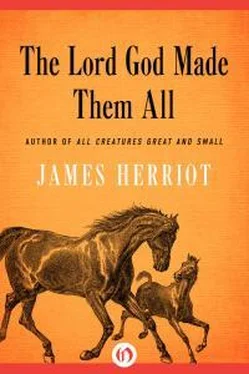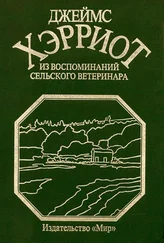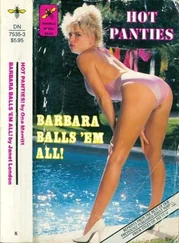Джеймс Хэрриот - The Lord God Made Them All
Здесь есть возможность читать онлайн «Джеймс Хэрриот - The Lord God Made Them All» весь текст электронной книги совершенно бесплатно (целиком полную версию без сокращений). В некоторых случаях можно слушать аудио, скачать через торрент в формате fb2 и присутствует краткое содержание. Год выпуска: 2011, ISBN: 2011, Издательство: Open Road Integrated Media, Жанр: Домашние животные, на английском языке. Описание произведения, (предисловие) а так же отзывы посетителей доступны на портале библиотеки ЛибКат.
- Название:The Lord God Made Them All
- Автор:
- Издательство:Open Road Integrated Media
- Жанр:
- Год:2011
- ISBN:9781453227930
- Рейтинг книги:3 / 5. Голосов: 1
-
Избранное:Добавить в избранное
- Отзывы:
-
Ваша оценка:
- 60
- 1
- 2
- 3
- 4
- 5
The Lord God Made Them All: краткое содержание, описание и аннотация
Предлагаем к чтению аннотацию, описание, краткое содержание или предисловие (зависит от того, что написал сам автор книги «The Lord God Made Them All»). Если вы не нашли необходимую информацию о книге — напишите в комментариях, мы постараемся отыскать её.
The Lord God Made Them All — читать онлайн бесплатно полную книгу (весь текст) целиком
Ниже представлен текст книги, разбитый по страницам. Система сохранения места последней прочитанной страницы, позволяет с удобством читать онлайн бесплатно книгу «The Lord God Made Them All», без необходимости каждый раз заново искать на чём Вы остановились. Поставьте закладку, и сможете в любой момент перейти на страницу, на которой закончили чтение.
Интервал:
Закладка:
Chapter
5
“HELLO! HELLO!” I BELLOWED.
“Hello! Hello!” little Jimmy piped just behind me.
I turned and looked at my son. He was four years old now and had been coming on my rounds with me for over a year. It was clear that he considered himself a veteran of the farmyards, an old hand versed in all aspects of agricultural lore.
This shouting was a common habit of mine. When a vet arrived on a farm, it was often surprisingly difficult to find the farmer. He might be a dot on a tractor half a mile across the fields; on rare occasions he might be in the house, but I always hoped to find him among the buildings, and I relied on a few brisk shouts to locate him.
Certain farms in our practice were for no apparent reason distinctive in that you could never find anybody around. The house door would be locked, and we would scour the barns, cow-houses and fold yards while our cries echoed back at us from the unheeding walls. Siegfried and I used to call them the “no-finding” places and they were responsible for a lot of wasted time.
Jimmy had caught on to the problem quite early, and there was no doubt he enjoyed the opportunity to exercise his lungs a bit. I watched him now as he strutted importantly over the cobbles, giving tongue every few seconds. He was also making an unnecessary amount of noise by clattering on the rough stones with his new boots.
Those boots were his pride, the final recognition of his status as veterinary assistant. When I first began to take him round with me, his initial reaction was the simple joy of a child at being able to see animals of all kinds, particularly the young ones—the lambs, foals, piglets, calves—and the thrill of discovery when he came upon a huddle of kittens in the straw or found a bitch with pups in a loose box.
Before long, however, he began to enlarge his horizons. He wanted to get into the action. The contents of my car boot were soon as familiar to him as his toy box at home, and he delighted in handing out the tins of stomach powder, the electuaries and red blisters, the white lotion and the still-revered long cartons of Universal Cattle Medicine. Finally he began to forestall me by rushing back to the car for the calcium and flutter valve as soon as he saw a recumbent cow. He had become a diagnostician as well.
I think the thing he enjoyed most was accompanying me on an evening call, if Helen would allow him to postpone his bedtime. He was in heaven driving into the country in the darkness, training my torch on a cow’s teat while I stitched it.
The farmers were kind, as they always are with young people. Even the most uncommunicative would grunt, “Ah see you’ve got t’apprentice with ye,” as we got out of the car.
But those farmers had something Jimmy coveted: their big hob-nailed boots. He had a great admiration for farmers in general; strong hardy men who spent their lives in the open and who pushed fearlessly among plunging packs of cattle and slapped the rumps of massive cart horses. I could see he was deeply impressed as he watched them—quite often small and stringy—mounting granary steps with twelve or sixteen stone stacks on their shoulders, or hanging on effortlessly to the noses of huge bullocks, their boots slithering over the floor, a laconic cigarette hanging from their lips.
It was those boots that got under Jimmy’s skin most of all. Sturdy and unyielding, they seemed to symbolise for him the character of the men who wore them.
Matters came to a head one day when we were conversing in the car. Or, rather, my son was doing the conversing in the form of a barrage of questions which I did my best to fend off while trying to think about my cases. These questions went on pretty well nonstop every day, and they followed a well-tried formula.
“What is the fastest train—the Blue Peter or the Flying Scotsman?”
“Well now … I really don’t know. I should say the Blue Peter.”
Then, getting into deeper water, “Is a giant train faster than a phantom racing car?”
“That’s a difficult one. Let’s see, now … maybe the phantom racer.”
Jimmy changed his tack suddenly. “That was a big man at the last farm wasn’t he?”
“He certainly was.”
“Was he bigger than Mr. Robinson?”
We were launching into his favourite “big man” game, and I knew how it would end, but I played my part. “Oh yes, he was.”
“Was he bigger than Mr. Leeming?”
“Certainly.”
“Was he bigger than Mr. Kirkley?”
“Without a doubt.”
Jimmy gave me a sidelong glance, and I knew he was about to play his two trump cards. “Was he bigger than the gas man?”
The towering gentleman who came to read the gas meters at Skeldale House had always fascinated my son, and I had to think very carefully about my reply.
“Well, you know, I really think he was.”
“Ah, but …” The corner of Jimmy’s mouth twitched up craftily. “Was he bigger than Mr. Thackray?”
That was the killer punch. Nobody was bigger than Mr. Thackray, who looked down on the other inhabitants of Darrowby from six feet seven inches.
I shrugged my shoulders in defeat. “No, I have to admit it. He wasn’t as big as Mr. Thackray.”
Jimmy smiled and nodded, well satisfied, then he began to hum a little tune, drumming his fingers on the dashboard at the same time. Soon I could see he was having trouble. He couldn’t remember how it went. Patience was not his strong point, and as he tried and stopped again and again, it was plain that he was rapidly becoming exasperated.
Finally, as we drove down a steep hill into a village and another abortive session of tum-te-tum-te-tum came to an abrupt halt, he rounded on me aggressively.
“You know,” he exploded, “I’m getting just about fed up of this!”
“I’m sorry to hear that, old lad.” I thought for a moment “I think it’s Lilliburlero you’re trying to get.” I gave a swift rendering.
“Yes, that’s it!” He slapped his knee and bawled out the melody at the top of his voice several times in triumph. This put him in such high good humour that he broached something that must have been on his mind for some time.
“Daddy,” he said. “Can I have some boots?”
“Boots? But you’ve got some already, haven’t you?” I pointed down at the little Wellingtons in which Helen always rigged him before he set out for the farms.
He gazed at his feet sadly before replying. “Yes, I know, but I want proper boots like the farmers.”
This was a facer. I didn’t know what to say. “But, Jim, little boys like you don’t have boots like that. Maybe when you’re bigger …”
“Oh, I want them now,” he moaned in anguished tones. “I want proper boots.”
At first I thought it was a passing whim, but he kept up his campaign for several days, reinforcing it with disgusted looks as Helen drew on the Wellingtons each morning and a listless slouching to convey the message that his footwear was entirely unsuitable for a man like him.
Finally Helen and I talked it over one night after he had gone to bed.
“They surely don’t have farm boots his size, do they?” I asked.
Helen shook her head. “I wouldn’t have thought so, but I’ll look around in any case.”
And it seemed that Jimmy wasn’t the only little boy to have this idea because within a week my wife returned, flushed with success and bearing the smallest pair of farm boots I had ever seen.
I couldn’t help laughing. They were so tiny, yet so perfect—thick hob-nailed soles, chunky uppers and a long row of lace-holes with metal loops at the top.
Jimmy didn’t laugh when he saw them. He handled them almost with awe and once he had got them on, his demeanour changed. He was naturally square-set and jaunty, but to see him striding round a farmyard in corduroy leggings and those boots you would think he owned the place. He clumped and stamped, held himself very upright and his cries of “Hello! Hello!” took on a new authority.
Читать дальшеИнтервал:
Закладка:
Похожие книги на «The Lord God Made Them All»
Представляем Вашему вниманию похожие книги на «The Lord God Made Them All» списком для выбора. Мы отобрали схожую по названию и смыслу литературу в надежде предоставить читателям больше вариантов отыскать новые, интересные, ещё непрочитанные произведения.
Обсуждение, отзывы о книге «The Lord God Made Them All» и просто собственные мнения читателей. Оставьте ваши комментарии, напишите, что Вы думаете о произведении, его смысле или главных героях. Укажите что конкретно понравилось, а что нет, и почему Вы так считаете.












